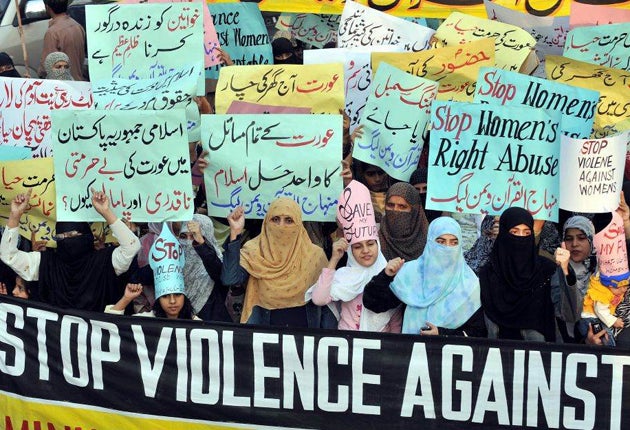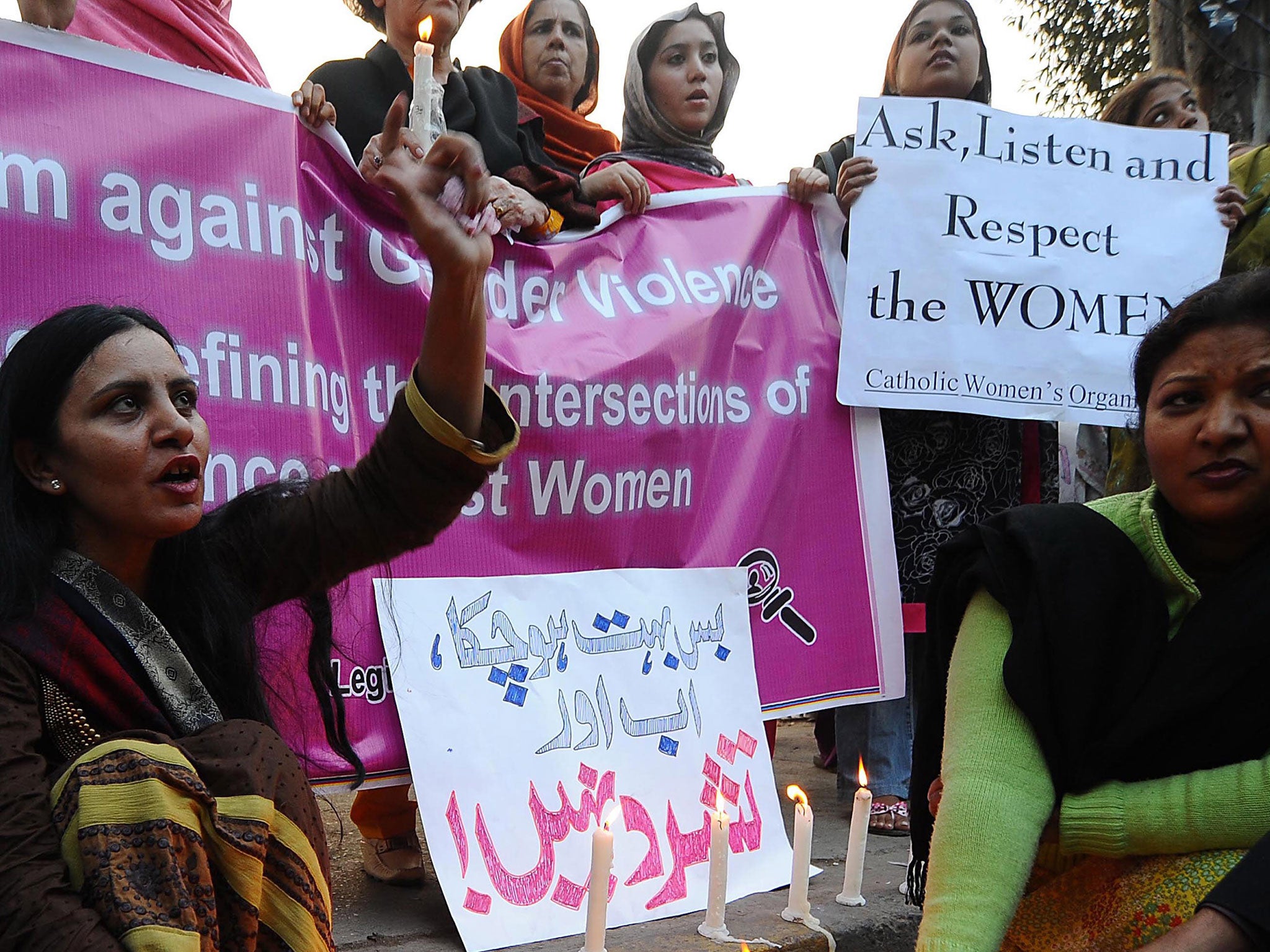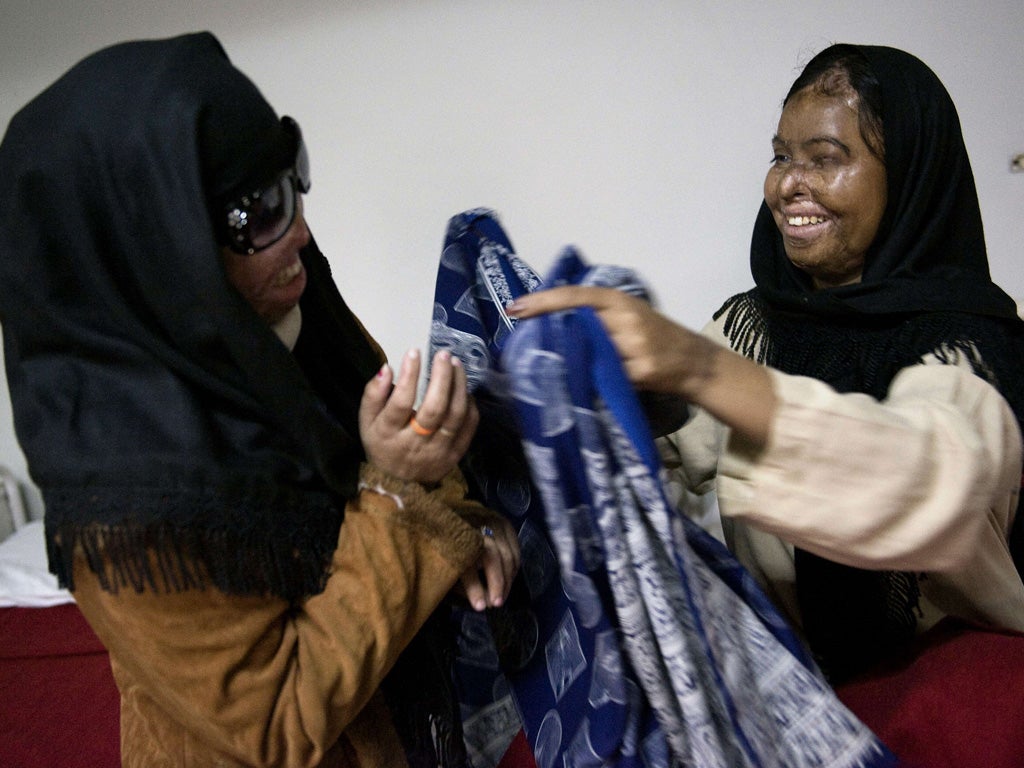'Rampant' violence against women in Pakistan revealed as groups fight 'un-Islamic' law against domestic abuse
A law aiming to protect women and punish abusers has met stiff resistance

Your support helps us to tell the story
From reproductive rights to climate change to Big Tech, The Independent is on the ground when the story is developing. Whether it's investigating the financials of Elon Musk's pro-Trump PAC or producing our latest documentary, 'The A Word', which shines a light on the American women fighting for reproductive rights, we know how important it is to parse out the facts from the messaging.
At such a critical moment in US history, we need reporters on the ground. Your donation allows us to keep sending journalists to speak to both sides of the story.
The Independent is trusted by Americans across the entire political spectrum. And unlike many other quality news outlets, we choose not to lock Americans out of our reporting and analysis with paywalls. We believe quality journalism should be available to everyone, paid for by those who can afford it.
Your support makes all the difference.A report has revealed the horrific extent of violence against women in Pakistan as religious groups continue to fight an “un-Islamic” law against domestic abuse.
More than a thousand victims of honour crimes were recorded last year, including a woman who was strangled and “cut up” by her brothers and two sisters shot for their “bad character”.
The annual report by the independent Human Rights Commission of Pakistan (HRCP) recorded gang rapes, kidnapping, acid attacks, amputations, burnings and said almost 800 women killed themselves or attempted suicide.
The report warned that despite a series of landmarks in 2015, which saw the first Pakistani female firefighter and rickshaw driver start work, exploitation and abuse remains rife with little judicial recourse.
Pakistan’s largest state passed a landmark law in February criminalising domestic violence, stalking, cybercrime and other forms of abuse but a coalition of more than 30 groups have demanded its withdrawal.
Mainstream Islamic political parties are among those opposing the Punjab Protection of Women Against Violence Act 2015 and threatening to launch nationwide protests.
The Council of Islamic Ideology, a constitutional body that advises the Pakistani government, declared the protections and punishments stipulated “un-Islamic”.
The council has previously supported a law requiring women alleging rape to get four male witnesses to testify in court before a case is heard and blocked harsher penalties for child marriages.
Fazlur Rehman, the chief of one of Pakistan's largest religious parties, the Jamiat-i-Ulema Islam, said the law was in conflict with both Islam and the constitution of Pakistan.
“This law makes a man insecure,” he told journalists. “This law is an attempt to make Pakistan a Western colony again.”
The Human Rights Commission of Pakistan report said prosecution rates for domestic violence and sexual offences were low, with women frequently too afraid to report the crimes or being intimidated into withdrawing complaints.
It recorded more than 900 rapes and sexual assaults in 2015, 279 instances of domestic violence, 143 of burning, 833 kidnappings and 777 suicides and attempted suicides.
The figures are believed to be far below the real figures as violence against women remains “rampant”.

The HRCP reported 987 honour crimes in 2015, with 1,096 female victims and 88 male victims, including an unknown number of children.
“The predominant causes of these killings in 2015 were domestic disputes, alleged illicit relations and exercising the right of choice in marriage,” the report said.
Guns were the most commonly used weapons and current and former spouses of the victims were the killers in most cases.
Reports included a woman who was “strangled to death and cut up by her brothers” in Sahianwala over allegations she was having an affair with a neighbour in May, and a man who shot his two sisters on suspicion of having “bad character” in Sargodha in September.
Numerous acid attacks were also reported, including one allegedly carried out by a police constable in Karachi, causing his 19-year-old victim to lose an eye.

The HRCP is calling on increased economic opportunities for women and roles in government, media and law enforcement to increase their influence in society.
“All pending laws on women protection must be passed on a priority,” it added. “The prosecution rate for violence against women must be increased to create a safer environment.”
But prominent Pakistani author Mohammed Hanif said it would be hard to shift the mindset of men who believe it is their “God-given right to give a woman a little thrashing”.
“I’m sure the nice folks campaigning against the bill don’t want to beat up their wives or murder their sisters, but they are fighting for their fellow men’s right to do just that,” he wrote in the New York Times.
“They are giving voice to Pakistani men’s collective misery over the fact that their women are out of control.”
Additional reporting by Reuters
Join our commenting forum
Join thought-provoking conversations, follow other Independent readers and see their replies
Comments